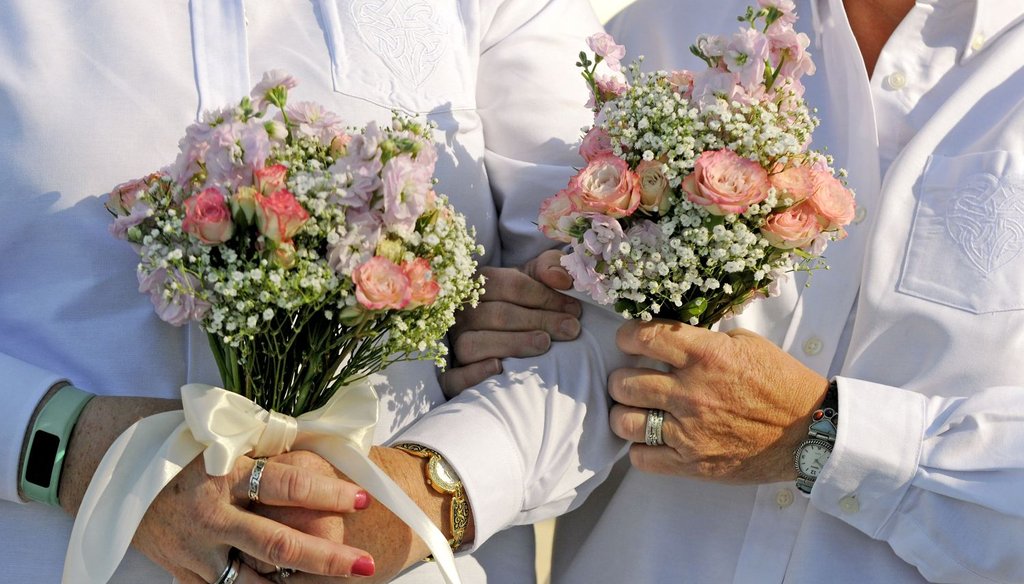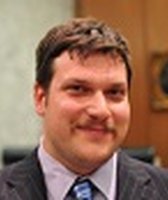Stand up for the facts!
Our only agenda is to publish the truth so you can be an informed participant in democracy.
We need your help.
I would like to contribute

A couple holds matching bouquets as they are married in front of the Duval County Courthouse on Jan. 6, 2015, in Jacksonville, Fla. (AP Photo)
Georgia is not party to the arguments over same-sex marriage Tuesday before the U.S. Supreme Court.
Still, Gov. Nathan Deal and Attorney General Sam Olens made headlines last week when they said the state, one of 14 that ban such marriages, would follow whatever ruling the court’s ruling is in June.
And the Peach state has been part of the ongoing debate over the issue, including a fierce back-and-forth on a controversial bill in the Legislature this year that critics said opened to door to discrimination against same-sex couples.
PolitiFact Georgia fact checked some claims about that religious liberty bill and some of the issues expected to come up again before the Supreme Court.
THE RELIGIOUS LIBERTY COMPONENT
The religious liberty bill proposed in the House was the second year Georgia lawmakers tried to pass a law to protect people from government interference on what could be considered religious belief.
This year’s House proposal was a retooled version of a measure that failed the year before, but opponents claimed it still would allow private businesses to discriminate against customers by citing religious beliefs.
"It is certainly my understanding that if corporations are not specifically excluded under state law, then corporations could still claim a religious exemption," Georgia Equality director Jeff Graham said in an interview with WABE radio.
Sponsor, state Rep. Sam Teasley, R-Marietta, agreed with Graham and said he would make what Mark Goldfeder, a law professor at Emory University told PolitiFact Georgia would be an easy fix.
The bill was to be amended to define a person as only a "natural person or religious organization," meaning only specific organizations, churches, temples and the like.
However, Teasley’s proposal fell by the wayside, when the Senate version of the proposal passed that chamber. It ultimately stalled over concerns there was no need for it. (Full AJC coverage here).
Our fact check, though, dealt with the House bill as drafted, and the claim it allow businesses to claim religious exemptions.
We rated Graham's statement True.
SHIFTING OPINIONS
Several high-profile politicians have, like the general public, fully shifted where they stand on the question of same-sex marriage.
The biggest flip-flop to supporting the unions came from President Barack Obama, whose 2012 announcement of support for same-sex marriage prompted TV news to break into daytime programming.
The president’s shift put new pressure on Atlanta Mayor Kasim Reed.
Reed had previously supported civil unions, a stance that drew negative attention from some of the city’s gay political groups and in some neighborhoods with large gay populations.
But by 2013, Reed also had flip-flopped. As we described on our Flip-O-Meter, Reed had long cited his religious beliefs from supporting same-sex marriage but had never said he opposed it. His shift to full support was subtle but significant in backing Obama’s position.
PREVIOUS COURT RULINGS
The Supreme Court will have final say on the issue, after years of conflicting rulings and a patchwork of laws based on federal district courts.
Our national PolitiFact partners have already fact checked claims in many of those cases, including those from attorneys David Boies and Ted Olson, who teamed up to overturn California’s Proposition 8 to ban gay marriage.
Olson said in January that the Supreme Court "15 times over the last 120 years has said that ‘marriage is a fundamental right" and "never once in any of those cases did it say that it had to be between a man and a woman."
Olson provided a list of 15 cases that addressed marriage as something like a "fundamental right" that did not specify marriage as a union between a man and woman. Several experts backed up his claim. Until recent years, though, the Supreme Court never had to address the question of whether or not marriage should be limited to a man and woman. We rated this claim True.
Boies said in 2014 that since June 2013, every one of more than 30 federal judges who have considered gay and lesbian rights "has ruled that marriage is a constitutional right and you cannot deprive individual citizens of that right based on their sexual orientation."
District judges have almost uniformly ruled for gay-marriage plaintiffs in this timeframe, but Boies’ count of such judges as of April 2014 was considerably off. We identified nine federal district judges who have issued such rulings by that point. PolitiFact Texas rated this claim Mostly False.
Our Sources
See individual reports.
















































